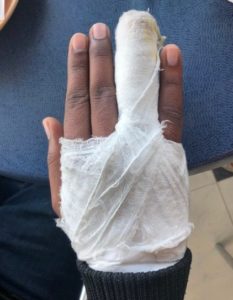Accordingly, his hand was then struck by the baton, causing serious injuries on his finger
| 12.06.2018 | Snos, Croatia, close to Snos | No Name Kitchen | 45.1726436, 15.6484499 | Croatia | Bosnia | yes | no | yes | no | no | no | 26 | Afghanistan, Pakistan, Bangladesh | 30 | beating (with batons/hands/other), gunshots | initial capture: 2 male officers in black uniforms, 12-13 male officers. At police station: 3 officers. At the border: 12-13 officers with black ski masks covering their faces, 4 police cars, 1 police van |
The group of 26 left Bihac (BIH) and crossed the border to Croatia on December 4, 2018. They walked for two days and in the evening of the second day, at around 8 pm, they left the forest and crossed a road. There, a police car with two male officers in black uniforms, carrying guns in their holsters, stopped them. The officers exited the car, fired two bullets in the air and shouted:
"Stop! Stop! Don't run!"
All 26 individuals stopped. It appeared as if the police had been waiting for them, because shortly after being stopped initially, a group of three more police cars arrived at the location.
"At first it was just one police car but then in one minute came three more police cars."
In total, there were twelve to thirteen male officers arriving in these three additional cars. At some point during their interaction with this group of officers, one of the individuals was asked if he had a phone and lied in response, saying no. When the officers then found the phone in his bags, they hit him on his hands and legs with batons. His injuries were quite painful and upon his return to Velika Kladuša (BIH), he sought treatment at the local hospital and was x-rayed. The results though ultimately determined that he didn't have any broken bones.
After ten minutes, a police van arrived which the group of 26 had to enter after all their bags were checked:
"They check all of our bags and everything and then they put us into the van"
During this entire process, none of the individuals asked the authorities for asylum because they had been caught by Croatian authorities before and had been told a number of times that they were not allowed to apply for asylum.
The group was then driven for around twenty minutes until they arrived at a secluded section of the Bosnian-Croatian border outside of Velika Kladuša between 8.30 and 9.30 pm. At this point, the door of the van was opened and individuals had to get off altogether at the same time.
Immediately after exiting the van, the 26 individuals were confronted by three officers with batons who hit him on their legs, hands and heads.
"Three police beat me for one minute. They didn't say anything to me."
They then forced them towards the border. The respondent also encountered officers hiding behind trees, who also hit him with batons to make him continue moving towards Bosnia.
"Then I moved closer to the border and there were six police officers hidden there"
In total, there were approximately twelve or thirteen officers present at the border. They wore black balaclavas, however the respondent recognized some of them as being the same individuals from the initial point of capture. Some stood off to the side and behind the van during the push-back. It was difficult for the respondent to say exactly how many officers were there:
"It was so dark and they beat us so much"
At one point during his push-back, the respondent was hit on the head with a baton and put his right hand up to protect himself. Accordingly, his hand was then struck by the baton, causing serious injuries on his finger. He later sought treatment from MSF and got provided with a splint for his finger.
After the push-back, the group of 26 crossed the border to Bosnia and walked for one hour back to the Miral camp outside of Velika Kladuša.
The respondent had earlier tried to cross the Croatian border twice, but as he had never been attacked by the Croatian officers, he was now shocked:
"I did not understand that they would be violent towards us, it was the first time I was beaten up."

